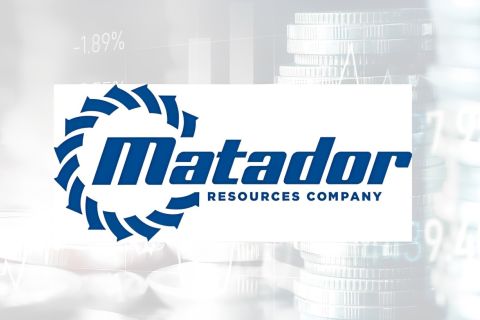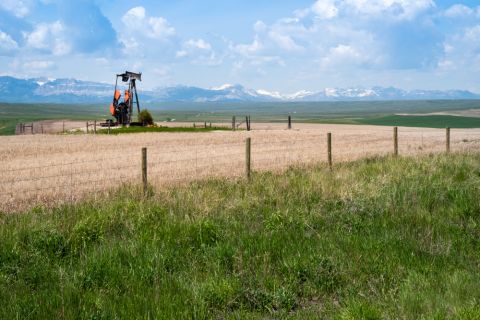Buoyed by US$30-plus oil and US$4-plus gas, drillers are making hole at a record pace throughout nearly all of Canada, not just in the Western Sedimentary Basin, says Pierre R. Alvarez, Calgary-based president of the Canadian Association of Petroleum Producers. This past February was a record drilling month in Canada, when 1,717 wells were drilled in 10 of the 13 provinces and territories across the county, he says. "For the year, we could see 15,000 to 17,000 wells drilled in Canada versus the 12,000-plus drilled last year." He adds, "We're firing on all four cylinders now, not only in terms of conventional drilling, but also oil-sands drilling-for which C$25- to C$35 billion in investment has been announced for the next 10 years." Some believe that during this time 50% of all Canadian hydrocarbon supply could come from oil-sands and heavy-oil production, with Syncrude, Suncor, Mobil and Petro-Canada leading the way. "In addition, we're seeing drilling off the east coast of Canada shifting from the exploration stage to the development stage," he says. "Sable Island is up and running, as well as other natural gas projects off the coast of Nova Scotia. And in Newfoundland, the Hibernia project is moving ahead, together with other oil projects. So we're looking at major supply gains from these regions going forward." The CAPP president also notes a significant return by operators to the Northwest Territories and the Yukon in northern Canada, where there is major natural gas potential. "Operators like Chevron, Petro-Canada and Anderson Exploration have made it clear they see this area-right up to the MacKenzie Delta-as an important part of their future exploration effort." Overarching all this bubbling upstream activity is an even more momentous event. "With the nearly completed Alliance Pipeline, the Northern Border and TransCanada PipeLine expansions, the Maritimes and Northeast Pipeline system, and the extension of the West Coast system up into the Northwest Territories, we're witnessing the last stages of infrastructure needed for one, unified North American natural gas market," says Alvarez. "And although Canadian production hasn't turned around completely yet to fill those export pipelines, we believe that during the next two years supply will come into balance as high-potential wells come online, particularly in northern Canada." There remain, however, several challenges for the Canadian energy industry, Alvarez concedes. The regulatory permitting process for getting wells drilled and tied in is still slower than a lot of producers would like. In addition, the industry is constrained by rig and manpower availability. "There's been no reinvestment in the Canadian rig fleet for some time-particularly on the deep-gas side-and a lot of people who left the industry during the 1997 to early 1999 trough aren't returning." Another challenge: high taxes. "Canadian producers are more highly taxed than many of our trading partners," says Alvarez. "And while we've seen some modest steps toward tax reform, significantly further steps need to be taken. The simple fact is, good geology isn't enough in this business anymore. Operators have to compete for capital on an international basis and therefore need to earn a reasonable return on their production." Equity is still scarce in the Canadian upstream sector, Alvarez allows. "Clearly, the investment community is demanding a focus on earnings, not just cash flow. But that's going to drive efficiencies and consolidation activity, and I'm confident that as this occurs, investors will return to this sector." Also positive about the Canadian energy outlook is Philip Swift, president of Calgary-based ARC Financial Corp. "Strong economic growth in virtually every region worldwide combined with high-capacity utilization factors for existing energy supplies support this attractive scenario," he says. "Positive fundamentals for the industry coupled with the potential for dramatic growth by successful junior energy companies creates a unique opportunity for long-term investors."' ARC Financial just closed its second energy venture fund for C$153.5 million. The ARC Canadian Energy Venture Fund 2 is a private-equity investment partnership focused on startup to early-stage energy companies. ARC Financial's first private-equity partnership, the ARC Canadian Energy Venture Fund, is fully invested at C$154.5 million. In addition to exploration and production and oilfield service investments, the second fund is targeting new energy and energy-technology investments. -Brian A. Toal and Nick Snow
Recommended Reading
CEO: Coterra ‘Deeply Curious’ on M&A Amid E&P Consolidation Wave
2024-02-26 - Coterra Energy has yet to get in on the large-scale M&A wave sweeping across the Lower 48—but CEO Tom Jorden said Coterra is keeping an eye on acquisition opportunities.
BP Restructures, Reduces Executive Team to 10
2024-04-18 - BP said the organizational changes will reduce duplication and reporting line complexity.
Matador Stock Offering to Pay for New Permian A&D—Analyst
2024-03-26 - Matador Resources is offering more than 5 million shares of stock for proceeds of $347 million to pay for newly disclosed transactions in Texas and New Mexico.
Kimmeridge Fast Forwards on SilverBow with Takeover Bid
2024-03-13 - Investment firm Kimmeridge Energy Management, which first asked for additional SilverBow Resources board seats, has followed up with a buyout offer. A deal would make a nearly 1 Bcfe/d Eagle Ford pureplay.
Laredo Oil Subsidiary, Erehwon Enter Into Drilling Agreement with Texakoma
2024-03-14 - The agreement with Lustre Oil and Erehwon Oil & Gas would allow Texakoma to participate in the development of 7,375 net acres of mineral rights in Valley County, Montana.





